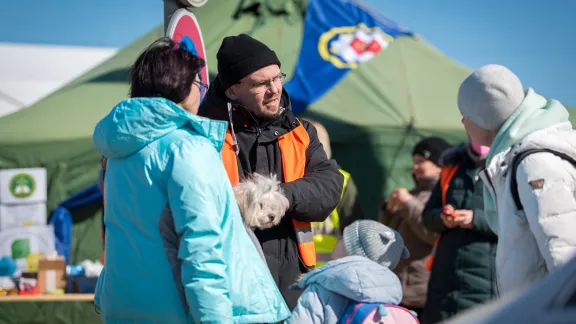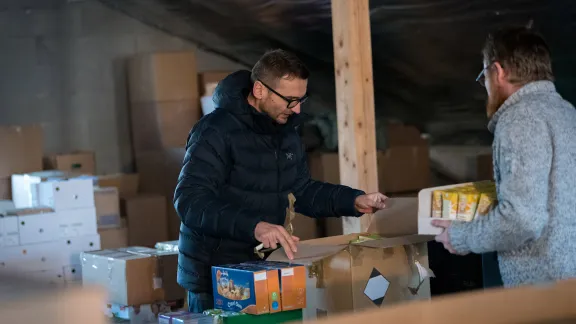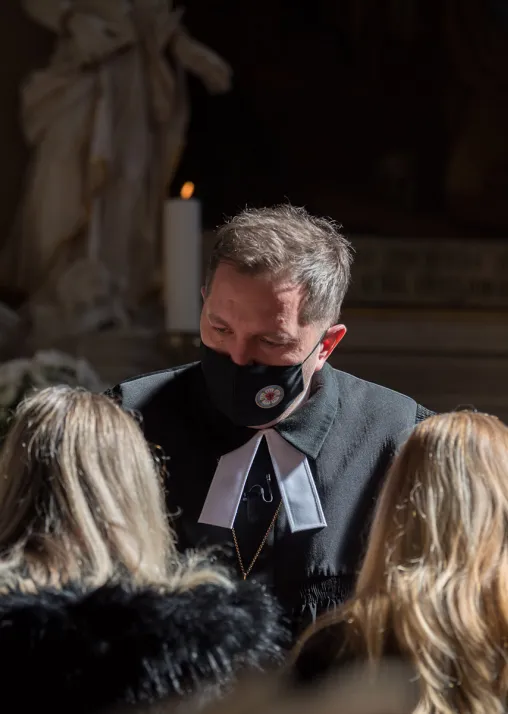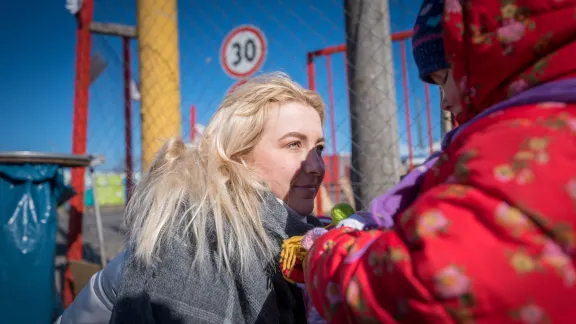"Churches today want to be here for others”

March 2022: A volunteer at a church-run support point at the Vyšné Nemecké border crossing between Slovakia and Ukraine shares information with a refugee family who have just arrived in Slovakia. At the onset of the war, the border crossing at Vyšné Nemecké saw up to some 10,000 refugees cross each day. Photo: LWF/Albin Hillert
(LWI) - “The situation in Ukraine is unexpected and horrible,” said Bishop Peter Mihoč of the Evangelical Church of the Augsburg Confession in Slovakia (Eastern district). “We are trying to respond to the dreadful conditions and serve in the name of love.” Bishop Mihoč on 12 July spoke about the humanitarian work of his church at the European Parliament in Brussels. On that occasion, he shared striking insights about challenges faced by local churches in providing support to those fleeing the war in Ukraine.
Since the Russian invasion of Ukraine on 24 February 2022, the Slovak Republic has played a vital role in providing humanitarian help to refugees from Ukraine. The Evangelical Church of the Augsburg Confession in Slovakia has congregations in Prešov, a city close to the Ukrainian border. Around 600,000 refugees have crossed these borders since the war started.

March 2022: Pastor Rev. Drahus Oslik and a volunteer prepare supplies in a storage room at the Pozdišovce congregation, for transport to the border crossing at Vyšné Nemecké. Pozdišovce is the closest to the Ukrainian border of all the Lutheran congregations in Slovakia, and so the church here plays a key role in supporting incoming refugees fleeing the war in Ukraine. Photo: LWF/Albin Hillert
“We could not remain indifferent”
Mihoč recalled the situation in February and March when the congregations were meeting thousands of frightened, traumatized, and suffering people. “As a church, as a country, and as a society we were not prepared for this situation. At the same time, we could not remain indifferent,” he says. “The first weeks of the war uncovered not only the terrible fruit of the war atrocities but have also shown the immense power of goodness, of the capacity to oppose evil with an active form of help.”
Bishop Mihoč detailed how, together with non-government partners, his church provided humanitarian help, meeting people directly at the border crossings, organizing food and accommodation, not only in the church but also in private homes. The church organized transportation, offered material and financial support and helped the Ukrainian refugees with the many administrative tasks: finding a home and work, school for the children, and events to help them integrate into local communities. “We have been trying to offer all of this already for several months,” Mihoč said.
Challenge to maintain long-term help
For many, what they hoped would be short-term support has become semi-permanent. “At this moment we have in our church several thousand refugees staying for the long term. It is a big challenge to maintain the spiritual and material help for them.” Bishop Mihoč explained in Brussels.

Bishop Peter Mihoc of the Evangelical Church of the Augsburg Confession in Slovakia (Eastern district) shares a word of prayer during Sunday service in March 2022 in Pozdišovce, Slovakia. Photo: LWF/Albin Hillert
In addition to providing free accommodation and food, social and health care to refugees in the Slovak Republik, the Evangelical Church of the Augsburg Confession in Slovakia is sending medical supplies, food and other much-needed relief items to Ukraine. Much of this work is done in cooperation with the German Evangelical Lutheran Church of Ukraine, an LWF member church, other churches in the region, and international partners such as the Lutheran World Federation (LWF).
“Openness and closeness, empathy and practical help, in the last months have revealed themselves as precious values in Slovakia, regardless of religious affiliation or social class of those we serve,” the bishop added.
I want to assure you that we the churches want to be here for others in these difficult days.
– Bishop MIHOC, Evangelical Church of the Augsburg Confession in Slovakia

March 2022: Christian volunteer Nicol Bandurcinova greets a little girl who has just arrived as a refugee from Ukraine, at the Vyšné Nemecké border crossing between Slovakia and Ukraine. Photo: LWF/Albin Hillert
Be church for others
“We don’t know how long this situation will last. Thus, we realize that at present the most important value is perseverance,” Bishop Mihoč said. “I think that our task today is to name the problem of war not from the perspective of geopolitics but from the perspective of humaneness. It is truly admirable and precious how Europe has been able to unite in naming and condemning evil,” Mihoč said.
In a pastoral encyclical, the bishops of the Lutheran church in Slovakia condemned the invasion of Ukraine and appealed to the Slovak people not to foster hatred towards the Russian nation as a whole, but to pray for forgiveness, reconciliation, and the end of this war.
Mihoč concluded his remarks citing the theologian Dietrich Bonhoeffer:” The Church is the Church only when it exists for others.” The bishop promised that “the churches, today, want to be here for others, in these days especially for the people from Ukraine.”
By LWF/ C. Kästner. Contribution by Naveen Quayyum/ Conference of European Churches
The seminar was held as part of Article 17 Treaty on the Functioning of the EU (TFEU), which foresees an open, transparent and regular dialogue between the EU institutions and churches and religious associations or communities. Bishop Mihoč participated representing the Council of European Churches (CEC).
LWF is coordinating a response through its member churches in Ukraine and the neighboring countries to ensure support to refugees fleeing Ukraine as well as their safe and dignified arrival. The work is supported by LWF's funding partners, including the Evangelical Lutheran Church in America.


